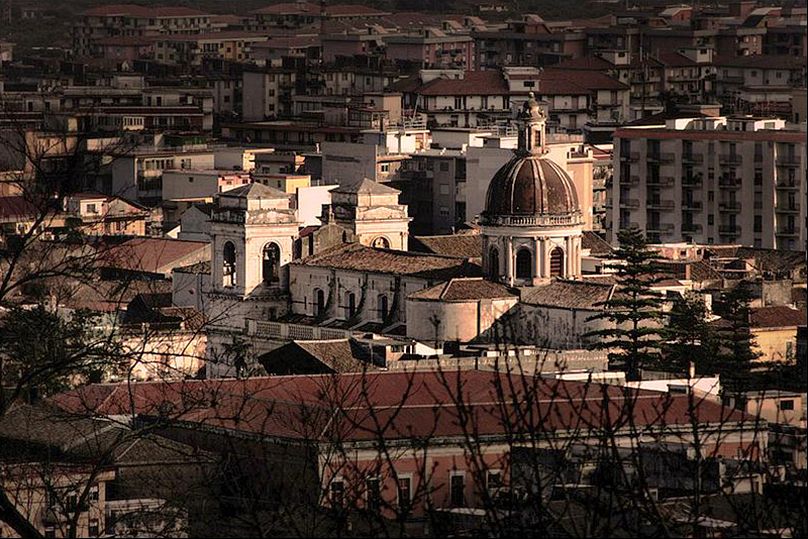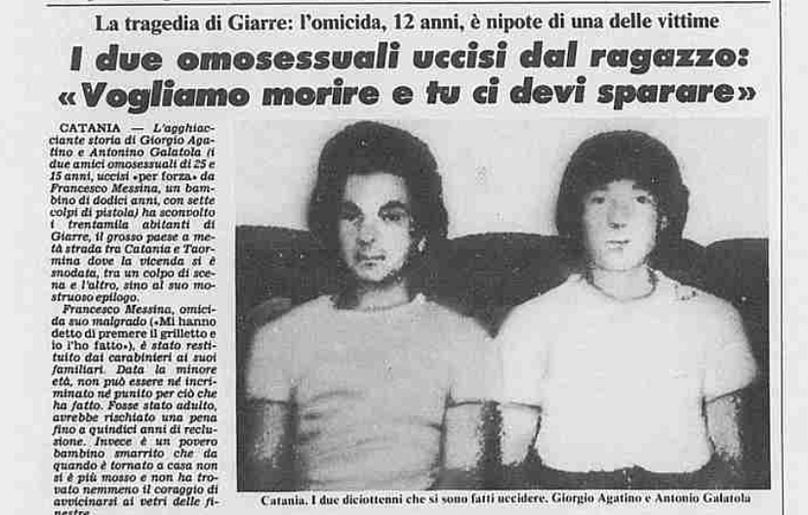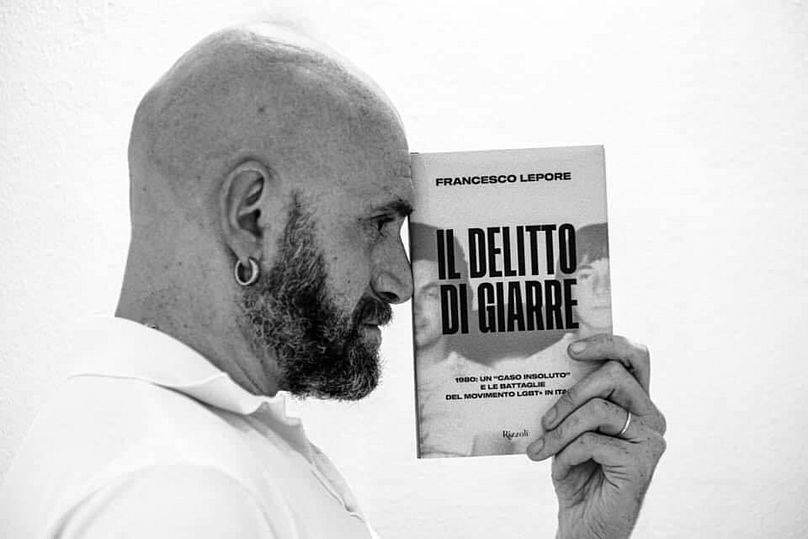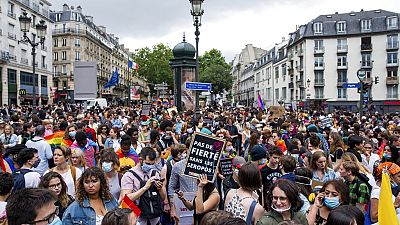In 1980, two gay young men were found dead in rural Sicily. After four decades, their unsolved murder has been making headlines in Italy.
On the evening of 31 October 1980, a Sicilian shepherd stumbled across two intertwined dead bodies under a lemon grove.
The bodies belonged to Giorgio and Toni, two gay youths from the town of Giarre, who had gone missing weeks before.
Victims of homophobia before and after their murder, the young men's deaths rocked the parochial heart of their town to its very core and shocked an Italy where anti-LGBTQ+ attitudes were still rife.
But much like the tragic fate Giorgio and Toni faced, their murder case lay dormant for decades, without any true justice being served in both the courts of law and public opinion.
Fast-forward to 2023, Giorgio and Toni's story is now on everyone's lips and minds in Italy: their picture splashed across front pages and posters, and they’ve even received silver screen treatment at the hands of Italy's biggest movie stars.
All of this begs the question: why did it take over four decades for their murder case to come back to the public's attention?
Star-crossed 'ziti': what is the Giarre murder?
Giarre, a sleepy town off the east Sicilian coast, seems like an unlikely setting for a gruesome murder story that would come to be seen as a symbol of Italy's deep-seated societal homophobia.
And yet, it was that very town which was fostering an insidious prejudicial climate that came to take the lives of two young gay men.
Giorgio Agatino, then 25, and Antonino "Toni" Galatola, 15, were both residents of Giarre. The former, frequently described as timid and of a laconic disposition, was the son of a well-to-do music teacher, with whom he had a deeply strained relationship; the latter, on the contrary, was from a close-knit, working-class family. The two met at the start of 1980 and developed a deep romantic bond, such that they were nicknamed iziti, or “boyfriends” in Sicilian dialect.
Some in the town, nevertheless, were somewhat less delicate: u puppu cu bullu, Sicilian for "certified f*ggot", was how Giorgio, in particular, came to be labelled.
On 17 October 1980, Giorgio and Toni went missing. The whole town rallied together to search for the missing couple, but to no avail at first. Their bodies would only be found by accident two weeks later, decomposed under the heat and with gunshot wounds to their heads.
Giorgio and Toni's deaths were initially depicted as the tragic joint suicide of two lovers who, haunted by the stigma of their homosexuality, decided to put an end to their lives. But when the murder weapon was found in a different location, it became clear that the facts were not adding up.
It’s at this point that a 13-year-old boy enters the picture. Francesco Messina, Toni’s own nephew, confessed to the murder to local police, claiming it was his uncle and Giorgio who had forced him to kill them.
Newspapers scurried to report on the issue with a morbid fascination. "The two homosexuals killed by the boy: 'We want to die and you must shoot us'" wrote La Stampa, one of Italy's most well-reputed newspapers.
The young boy's story all came crashing down when he recanted days later, claiming he’d been pressured into lying. At the age of 13, Messina was under Italy's age of legal majority, meaning he could not have faced a prison sentence — and would have been a convenient scapegoat to frame.
On 2 November, All Souls' Day, solemn funerals were held for the two victims, which saw most of Giarre’s residents come to express their grief.
That day, the public's memory of the murder was buried alongside Giorgio and Toni. A veil of silence was drawn over Giarre, while the press quickly came to forget the crime, which ended up passing into oblivion.
The murder of Giorgio and Toni to this day remains officially unsolved, although the work of one journalist, in particular, revealed the likely identity of the culprit.
The culprit? A new documentary claims to have the answer
In the decades that followed the Giarre murder, very few individuals went to any great lengths to honour the memory of Giorgio and Toni or raise awareness of their plight.
The case's impact on Italy’s queer community was palpable — indeed, it is often deemed the "catalyst" for the creation of Arcigay, the country’s main LGBTQ+ rights movement, a month later — but public awareness of the murder was lacking.
All of this changed when, in the middle of the COVID-19 pandemic, Francesco Lepore, a Catholic priest-turned-LGBTQ+ activist and journalist, decided to write a book on the murder.
Reflecting on his journey writing his book, Il Delitto di Giarre ('The Giarre Murder') Lepore recounts why it took four decades for the case to come back to the public's attention.
"Successive administrations in Giarre were reluctant to lift the veil on this issue," Lepore told Euronews Culture, "which was still seen until a few years ago as a stain on the village."
But the arrival of a new town mayor in 2016 signalled a changing tide for Giarre.
On 31 October 2020, exactly 40 years after Giorgio and Toni's bodies were found, a same-sex civil union was celebrated in Giarre, officiated by Mayor Angelo D'Anna himself, with the newlyweds bringing flowers to the star-crossed lovers’ tombs.
The event sparked significant media interest and brought journalists from all over Italy to Giarre, including Lepore, who was writing for online newspaper Linkiesta.
What started off as an article ended up metamorphosing into a full-length book of painstaking investigative work that chronicles both the murder case and the impact it had on the Italian LGBTQ+ rights movement.
Lepore's opus comes to a bombshell conclusion, which he reached after speaking to a surviving relative: Giorgio and Toni's murder, he alleges, was at the hands of the latter's family, and represented a homophobic honour killing.
Now, Lepore's book has been transformed into a documentary which will jointly air on Sky's History and Crime + Investigation channels at 22:00 on Wednesday. It interviews residents of Giarre and members of Toni's surviving family while shedding light on the tragic events that unfolded 43 years ago.
Stranizza: Blockbuster film treatment and the ensuing controversy
Perhaps the biggest reason why the Giarre murder has been propelled into the headlines is the silver screen treatment it received at the hands of Italy's cinematic elite.
Earlier this year, the tragic story of Giorgio and Toni was turned into a fictionalised blockbuster, Stranizza d'amuri (released as Fireworks in the English-speaking market) directed by Giuseppe Fiorello, one of Italy's most well-known faces.
The film is only loosely inspired by the actual events that unfolded in Giarre. The year was changed to 1982, to provide the FIFA World Cup as a dramatic backdrop to the unfolding love story, and Giorgio and Toni were renamed Gianni and Nino.
It's only been three months since the film's 23 March release, and Stranizza d'amuri is already heaping up the praise and box office success.
The film grossed over €1 million domestically within its first month of release -- an impressive sum for an Italian production -- and soared to the box office's top ten where it competed with American giants such as John Wick: Chapter 4 and The Whale.
Fiorello himself picked up Italy's prestigious Nastro d'Argento award for Best New Director and promoted the film on Che tempo che fa, a widely watched talk show which boasts Barack Obama, Meryl Streep and Lady Gaga among its former guests.
"This first film of mine was born from an article that celebrated the 30-year anniversary of the Giarre murder, a case I didn't know," Fiorello stated. "That triggered a deep sense of guilt within me: as a Sicilian, I felt partly to blame for what had happened."
But amid all of the acclaim, Stranizza d'amuri has also accrued something decidedly less flattering: a copyright infringement lawsuit, and ensuing media hurricane.
Ten years ago, Rome-born writer Valerio la Martire published a novel, Stranizza, which itself was inspired by the Giarre murder. And the eponymously titled film -- which does not credit la Martire -- displays some remarkable similarities with the novel, starting from one of the protagonists’ names (Nino), certain plot details and the narrative style.
Within a month of Stranizza d'amuri's release, la Martire's lawsuit was publicised on Corriere della Sera, Italy's newspaper of record, sparking a media buzz which -- for better or for worse -- helped keep the Giarre murder on the front pages.
Speaking about his novel to Euronews Culture, la Martire remarked on how his book was the first to draw direct inspiration from the tragic events that unfolded in Giarre.
"When I started writing Stranizza, there were already a few other books written about the [murder], but that was only very loosely inspired by it," he stated. "Even within activist circles, people didn't know Giorgio and Toni's story. People didn't remember it."
The 41-year-old author claims he was initially contacted by Fiorello's production, after which he was told that the final film would no longer be drawn from his novel, and he was subsequently dropped.
To his dismay, la Martire found that Stranizza d'amuri was much closer to his work than he'd imagined, which led him to launch an ongoing legal battle with the film's production company.
"It's left such a bitter aftertaste," la Martire lamented. "I hope to close this chapter of my life and get on with what I do best -- writing."
Regardless of the lawsuit and the controversy that surrounds it, la Martire did leave some space for optimism, noting positively on the media attention that the Giarre murder has been receiving -- especially in the midst of Italy's political climate, which is increasingly hostile towards LGBTQ+ rights.
"This is a story that Italy needs right now," he stated. "Conditions for LGBTQ+ people may be better than [43 years ago], but this does not mean things cannot change."
"The Giarre murder sheds light on how the path to acceptance is far from over," he added.








